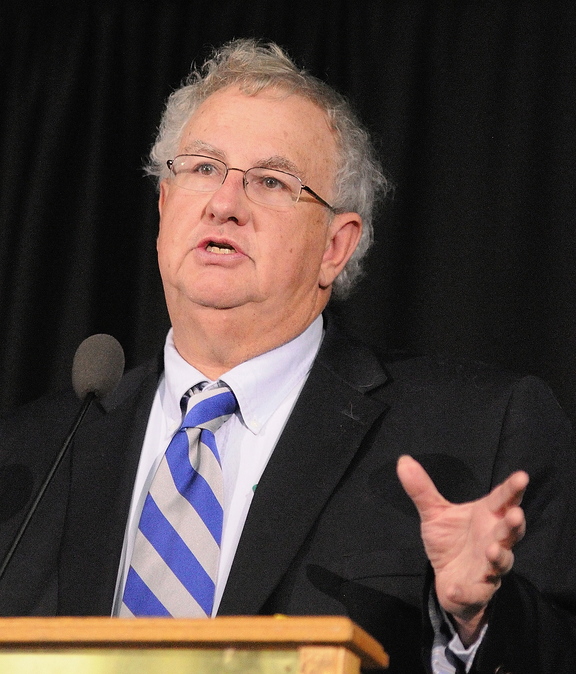AUGUSTA — Former state economist Charles Colgan opened his presentation about the U.S. and state economy in front of tax professionals with a black-and-white image of a woman tied to railroad tracks with a train steaming toward her.
The woman represented the economy, he said; and the train, Congress.
“The gap between where we are now and pre-recession levels of employment is almost entirely explained by federal fiscal policy,” Colgan said Wednesday afternoon at the Augusta Civic Center. “Not quite all of it, but about 90 percent if it. That’s a really heavy-duty set of problems we have to deal with here.”
Colgan, a professor at the Muskie School of Public Service at the University of Southern Maine, gave an overview of his predictions for the U.S. and state economy and described current issues in tax policy for the keynote of the annual Maine Tax Forum — a convention covering issues facing tax professionals.
Besides outlining the ways federal fiscal policy and uncertainty have stunted the economy’s recovery, Colgan, who is known for his annual state economic forecasts each January, described the problem with Maine’s aging workforce and ways tax issues should be addressed to keep the economy moving forward.
Colgan said fiscal uncertainty at the federal level has restricted the country’s economic output and made economic recovery more difficult.
Since the end of 2009, fiscal policy uncertainty has reduced the growth of the U.S. economy by 0.3 percent per year, according to a study by Macroeconomic Advisors, leading to about 900,000 people not being hired, Colgan said.
That, coupled with reductions in discretionary spending as a result of fiscal action, such as the sequester cuts, has led to about 2.1 million jobs not being created since the end of 2009, close to the amount not yet regained from the Great Recession, Colgan said
He said the latest economic crisis — the battle about the debt ceiling in October, which led to a 16-day federal government shutdown — further damaged the economy’s growth, and another possible showdown is right around the corner. Congress passed a continuing resolution Oct. 16 to fund the government until Jan. 15 of next year and suspended the debt ceiling until Feb. 7. Colgan told the audience to mark their calendars.
He said he expects, or at least hopes, the debate won’t lead down the same path as it did in October, but “the damage has already been done. The damage to the American economy from this lack of clarity about fiscal policy from tax and spending policy has already been done.”
When asked what he would do if he could control Congress, Colgan said he would get rid of the requirement of a debt ceiling, which gives permission to the executive branch to spend money Congress already has approved.
He said it has never been effective because fiscal policy is made in the budget and not in debt ceiling legislation.
“The debt ceiling has essentially become a nuclear weapon in the hands of both parties, which neither party can really be trusted with,” Colgan said. “I would eliminate that entirely,” he added. “It makes no difference in fiscal policy whatsoever and (eliminating it) would unilaterally disarm everyone from having to threaten to destroy the world economy in order to make their policy preferences enacted.”
At the state level, Colgan said Maine’s aging workforce and declining population will force the state to rely increasingly on attracting out-of-staters to live or at least work in Maine.
By the end of 2018, all of Maine’s 16 counties will be in a natural population decline, he said, meaning more people will be dying than being born. Even if the state is able to keep more young people from leaving, not enough people were born between 1990 and 2010 to replace the baby boomer generation, Colgan said.
Maine has the highest median age in the nation and the second-highest proportion of people age 65 and older.
“We’re going to have to replace the baby boomer generation, and we’re going to have to replace it almost entirely with people outside of Maine,” he said.
In terms of tax policy, Colgan said the federal government needs to come up with a way to raise tax revenue through online sales. An increasing amount of purchases are made online, and the sector will make up 30 percent of all sales by the end of the decade, Colgan said.
“Online sales are going to pose a major threat to revenues by increasing the reliance on very volatile base in cars and building supplies services,” he said.
He advised that states should try shifting the source of tax revenue more toward consumption-based, such as sales tax, from income and capital gains taxes.
Paul Koenig — 207-621-5663 pkoenig@centralmaine.com Twitter: @paul_koenig
Send questions/comments to the editors.



Success. Please wait for the page to reload. If the page does not reload within 5 seconds, please refresh the page.
Enter your email and password to access comments.
Hi, to comment on stories you must . This profile is in addition to your subscription and website login.
Already have a commenting profile? .
Invalid username/password.
Please check your email to confirm and complete your registration.
Only subscribers are eligible to post comments. Please subscribe or login first for digital access. Here’s why.
Use the form below to reset your password. When you've submitted your account email, we will send an email with a reset code.